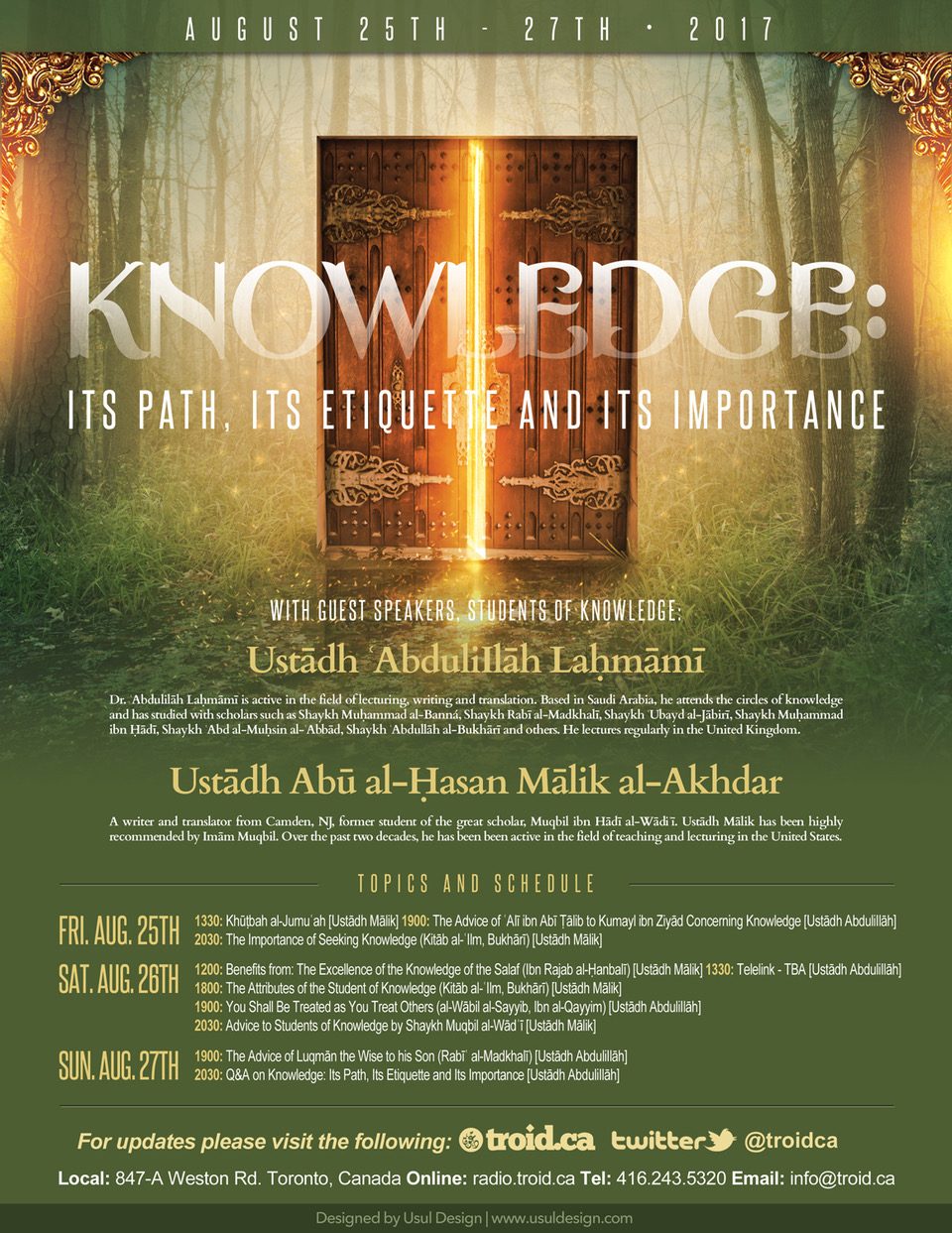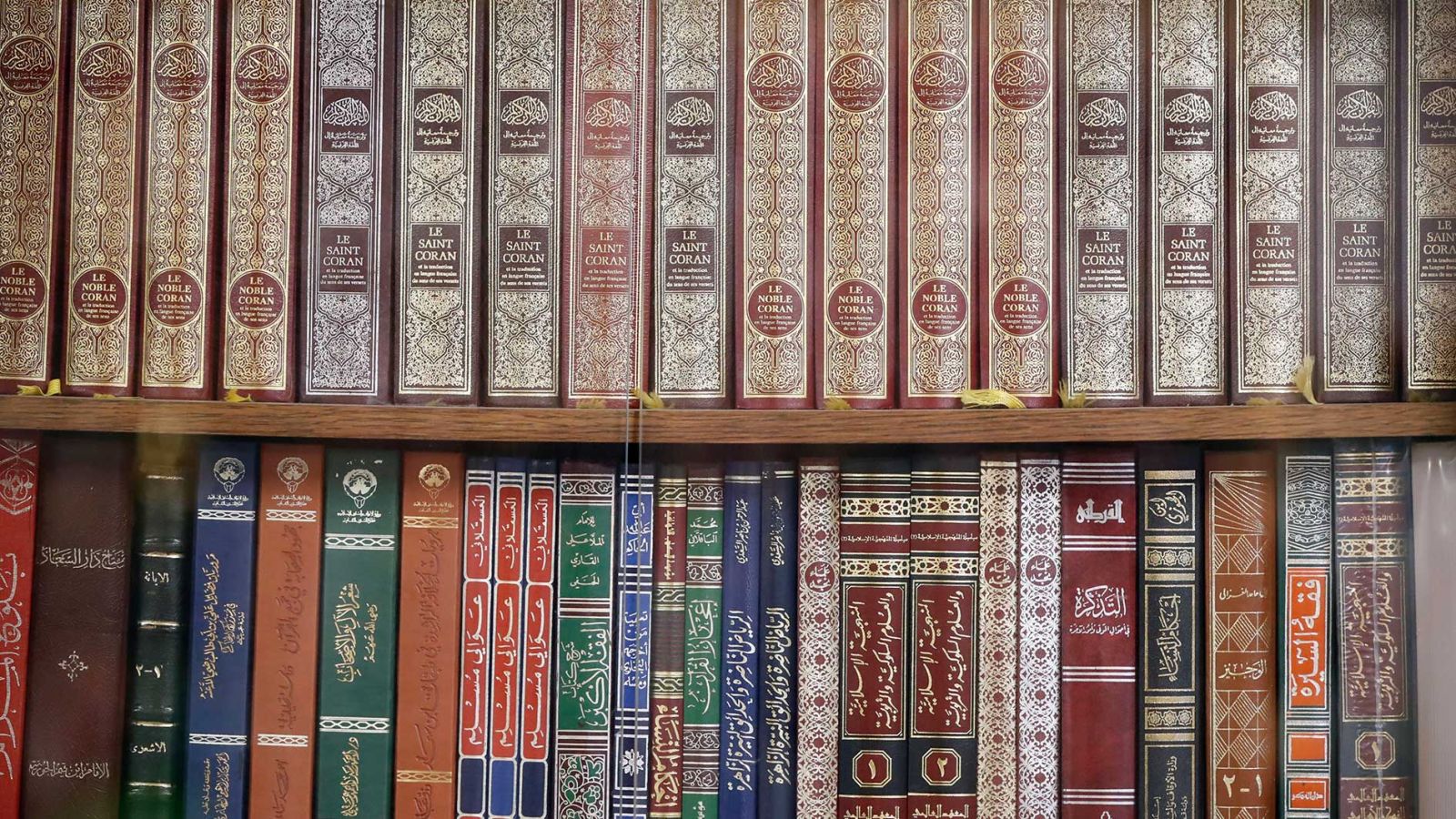From the beneficial points made by our noble teacher in this lecture:
- Ibn al-Qayyim was a great Imām and student of Shaykh al-Islām Ibn Taymīyyah (raḥimahullāh) and he authored many beneficial works.
- He was born in the year 691 AH and died 751 AH leaving behind many very beneficial works, including the work which we will be drawing upon today; Al-Wābil al-Sayyib. This book serves as a reminder for the believer in softening the hearts through knowledge of Allāh and evaluating your relationship with Him.
- Indeed, as the Messenger (ṣallallāhu ʿalayhi wa-sallam) said, ‘The heart is between the two fingers of al-Raḥmān, and He changes it as he wills..’ A man could wake upon īmān in the morning and go to sleep upon kufr, a disbeliever.
- The heart must be protected from doubts and desires with the dhikr of Allāh, because Shayṭān calls it to desires.
- It is upon the believer to guard his faculties of hearing, sight and speech; the limbs and the stomach from falling into sin and transgression; shubuḥāt and shaḥawāt.
- Guard your obligatory duties and protect yourself from the harām and you will find Allāh will aid you and give that which is good. When you seek aid from Allāh, you seek it from Him alone, for He is the one who removes the harm. He has made you as inheritors of the earth, so to Allāh we should turn to and seek aid and call upon for His help for He is the best of helpers.
- The people who turn to Allāh and upon the dhikr of Allāh are the happiest of people.
- If you want your adʿū (supplications) to be accepted then it is imperative that you believe in Allāh correctly upon tawḥīd, without associating any partners with him, for indeed tawḥīd rectifies societies and brings about the help and blessing of Allāh (ṣubḥānahu wa taʿāla. It is He who has guided you out from darkness to light, so call and rely upon Allāh for verily Allāh loves those who rely upon the Him; the One who is Perfect-Living, who doesn’t die, whereas we live and we get sick, we tire, we age and inevitably return to Allāh.
- Nothing is hidden from Allāh, not even the smallest thing visible to the naked eye, even an ant weight of a deed, In sūrah al-Zalzalah the ayah is often translated as ‘ an atoms weight’ however, this is incorrect since the smallest thing at the time of the ṣaḥābah was like an ant. this weight of a deed will be presented to you on Yawm al-Qiyyāmah, the scales will measure your deeds, and the heaviest deed on that day will be your ʿaqīdah; this is present in the ḥadīth of the man who will come with 99 scrolls of bad deeds, and one parchment of good deeds and on that parchment will be the kalimah al-tawḥīd; and though he fell short with regards to his misdeeds this word will outweigh all of the 99 scrolls of bad deeds. This is an clear indication that tawḥīd comes first and last, up until you die.
- The Prophet (ṣallallāhu ʿalayhi wa-sallam) said, ‘Whoever says Lā ilāha illā Allāh, sincerely from his heart will enter paradise.’
- He (ṣallallāhu ʿalayhi wa-sallam) also said, upon his death bed, ‘The curse of Allāh be upon the Jews and the Christians for taking the graves of prophets as place of worship.’ The Prophet (ṣallallāhu ʿalayhi wa-sallam) was calling to tawḥīd even up until his last moment.
- What do we seek in this life? Are we slaves of Allāh or slaves of this dunyá and the dirḥam. Allāh (subḥānahu wa taʿalā) on countless occasions describes the Messenger (ṣallallāhu ʿalayhi wa-sallam) as being a slave and worshipper of Allāh.
- Ibn Taymīyyah (raḥimahullāh) dedicated an entire book, al-ʿUbūdīyyah to the servitude of Allāh.
- This book by Ibn al-Qayyim (raḥimahullāh)—Al-Wābil al-Sayyib—is all about the dhikr of Allāh, and how to be a slave and worshipper of Allāh and contains within it that which really and truly serves as a good reminder.
- From that is, ‘Just as you, so shall be done to you’; firstly look to your relationship with Allāh and the people. If you show mercy, kindness and gentleness towards Ahl al-Sunnah, then Allāh will be merciful to you.
- The Prophet (ṣallallāhu ʿalayhi wa-sallam) said, ‘Whenever gentleness enters into an affair it beautifies it, and whenever harshness enters into an affair disfigures it.’
- Have mercy on those upon the earth and the One above the sky will have mercy on you.
- Ibn Taymīyyah (raḥimahullāh) in Majmūʿ al-Fatāwá: Ahl al-Sunnah are the most merciful to the creation, and the most knowledgeable concerning the truth.’ This is because they are from the ṭāʾifah al-Manṣūrah; they are not harmed by those who abandon them, or oppose them.
- The Messenger Muḥammad (ṣallallāhu ʿalayhi wa-sallam) who spoke concerning gentleness was the same Messenger who was severe against bidʿah, even before it even appeared.
- Ibn Taymīyyah (raḥimahullāh) mentions concerning the Rawāfiḍ: The Prophet (ṣallallāhu ʿalayhi wa-sallam) forewarned against those who revile his Companinos.
An admonition and severe warning regarding the people of innovation can be found in the ḥadīth of those who will be prevented from drinking from the Messenger (ṣallallāhu ʿalayhi wa-sallam) his ḥawd due to their changing the religion and brininging innovation. - The Prophet (ṣallallāhu ʿalayhi wa-sallam) said in the ḥadīth of Irbād, ‘stick to my sunnah and the sunnah of the rightly guided caliphs, because after me you will see many differences… bite onto it with your molar teeth.’
- Many of the adkhār are filled with the kalimah al-tawḥīd, whether it be the supplications recited during the rights of Ḥajjj, or the supplication of going to the market; when mounting upon transport to waking up in the morning and going to sleep in the evening.
- The tongue is caged behind the teeth and the lips; it should only used in enjoiing the good and forbidding the evil, and not in order to displease Allāh by causing dissension or splitting the ranks of the Muslims.














